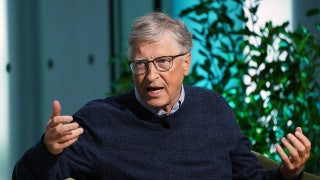The 2016 Democratic presidential debates have so far been known as civil, low-key contests, but the simmering accusations about party leaders favoring front-runner Hillary Clinton hit a boiling point over the recent date-breach flap and are spilling into Saturday night’s debate.
The incident involved several staffers for primary rival Sen. Bernie Sanders accessing some Clinton voter information in the Democratic National Committee database, which resulted in the group on Friday blocking the Sanders campaign’s access to the entire database.
"Clearly, in this case, they are trying to help the Clinton campaign," said Sanders campaign manager Jeff Weaver. “We have invested enormous campaign resources in acquiring the rights to use this proprietary information. But the DNC, in an inappropriate overreaction, has denied us access to our own data.”
The ABC News debate begins at 8 p.m. eastern and will be held at St. Anselm College, in Manchester, N.H.
By late Friday, the DNC had restored access for the Sanders campaign. But the move does not appear to have stopped accusations -- and even ridicule -- about the group’s handling of the debates, specifically that too few were scheduled and that they have been staged when few potential voters are watching.
“They keep scheduling the Democratic debates at like 2 a.m. on Alaska PBS,” GOP presidential candidate Texas Sen. Ted Cruz said at rally Friday in Virginia. “It’s almost like they don’t want anybody to see their candidates for president.”
To be sure, Cruz was taking an easy shot at the rival party in the bid for the White House.
But similar arguments have been made by Martin O’Malley, the third 2016 Democratic candidate and a former Maryland governor who is fighting for exposure to keep alive his campaign.
In October, he agreed with the suggestion that the debate setup was “rigged,” blamed DNC Chairwoman Florida Rep. Debbie Wasserman Schultz and accused Washington insiders of trying to “circle the wagons and protect one another.”
Democrats have six sanctioned 2016 debates, compared to 11 for Republicans.
Sanders, House Minority Leader Nancy Pelosi, Calif., and other Democrats have also called for their Democratic leaders to have more debates.
Clinton has 55.9 percent of the vote, compared to 31.1 percent for Sanders and 3 percent for O’Malley, according to the most recent averaging of polls by the nonpartisan website RealClearPolitics.com
In the first 2016 Democratic debate, the Clinton campaign was stuck defending Clinton’s use of a private server and email to conduct official business when she was secretary of state. And Sanders said: “The American people are sick and tired of hearing about your damn emails.”
The remark ended perhaps Sanders’ best attack line at the time. But this time, he may well handle the data breach issue much differently, considering that he’s fighting to stay relevant in a race that has moved away from his messages about income inequality, college affordability and other socio-economic issues.
After being denied access to the database, the Sanders campaign sent a fundraising email to supporters that said his "quick rise in the national polls (has) caused the Democratic National Committee to place its thumb on the scales in support of Hillary Clinton's campaign."
Neither candidate has spoken publically yet about the issue.
Like the Republican debate on Tuesday, the Democratic debate is expected to focus more on nation security and how to stop the Islamic State and other extremist groups, which apparently inspired the perpetrators in the deadly Paris bombing attacks in November and the shootings earlier this month in San Bernardino, Calif., in which 14 people were killed and 21 others wounded.
Republicans have tried to tie Clinton to her role as secretary of state in the Obama administration, under which the Islamic State has flourished in Iraq and Syria.
Sanders, a Vermont independent and self-described socialist, is not considered hawkish on national defense or foreign policy.
Debates have turned into big business for cable news networks this year, breaking viewership records. Twenty-five million people watched the first Republican debate. And 15.3 million watched the first Democratic debate in October. But such numbers are not expected Saturday, six days before Christmas. Viewership is expected to be low.
The Associated Press contributed to this report.












































